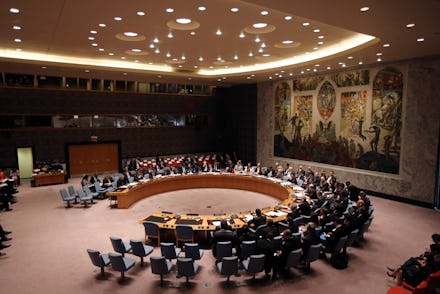Saudi Arabia and the U.S. Are Having a Lovers Quarrel, But They'll Get Back Together

Last Monday, Saudi Arabia became the first country to be elected to a non-permanent seat on the U.N. Security Council — and then decline the honor. It’s clear that Saudi Arabia, one of America’s closest allies in the Middle East, did this partially to express its displeasure with U.S. policy in the Middle East. However, the cooling of relations between Washington and Riyadh won’t last long.
It may be counter-intuitive to those who believe the Kingdom’skingdom's tremendous oil wealth translates into corresponding political or military influence, but Saudi Arabia is actually a vulnerable country. Oil production accounts for almost eighty percent80% of government revenue and nearly half of GDP. However, Saudi Arabia has very little of anything else. The Kkingdom imports almost everything, including key commodities such as food, medical supplies, and weapons.
Saudi Arabia’s government is thus dependent on the export of oil, and on the import of basically everything else. Yet it lacks the resources to defend itself from other regional powers. It should come as no surprise that a nation so utterly dependent on maritime trade would closely ally itself towith the United States, whose navy guarantees the freedom of the seas. The diplomatic spat between Riyadh and Washington does not change this underlying reality. On the contrary, it is Riyadh’s very vulnerability that is driving its current schism with Washington and will inevitably drive its reconciliation.
The schism has its roots in the two allies’ divergent views on the Arab Spring. Americans view it the same way they view the fall of the Berlin Wall: with sympathy for those who rise up against tyranny. In sharp contrast, the Saudi monarchy — one of the most repressive absolute monarchiesy’s left on Earth — views the Arab Spring as an existential threat.
When the Arab Spring spread to Egypt, American and Saudi views inevitably clashed. Rather than see a radical democracy at its borders, Saudi Arabia supported the military coup against the popularly elected leader of the Muslim Brotherhood, Mohamed Morsi. American policymakers undoubtedly saw that the coup was in America’s long-term interest of regional stability. However, the U.S. couldn’t be seen supporting a coup against a democratically -elected government. President Obama was thus put in the somewhat awkward position of supporting the avowedly anti-American Morsi and withdrawing military aid from the Egyptian army. The Saudis stepped in and gave the military regime the cash the Americans had just withdrawn and chalked it up toas a win for its own domestic stability, no thanks to the fickle U.S.
The disagreement over Egypt’s coup wasn’t a big deal because Riyadh and Washington shared other interests, especially regarding Assad’s ouster from Syria. Iran, —Assad’s primary sponsor, —is Saudi Arabia’s regional rival and the target of American ire over its nuclear program. Riyadh and Washington both want Assad gone to curtail Iranian influence. The U.S. sees an added bonus of promoting democracy, while ; Saudi Arabia is apathetic toward democracy (so long as it’s not in Saudi Arabia). Hence the Saudis support the Arab Spring in Syria even as they work to squash it in Egypt.
When it seemed that Assad had crossed President Obama’s red line on chemical weapons, Saudi Arabia hoped that the U.S. would finally intervene and deal the final blow to Assad. The Saudis would, of course, have influence over any Syrian government that emerged after the fact. However, Obama backed off, and Assad emerged stronger than he had been before. More than likely, the Saudis privately cursed the Americans for the missed opportunity to replace an Iranian proxy in Damascus with a Saudi one.
The final straw didn’t come until the possibility of an American rapprochement with Iran became a reality. After Hassan Rouhani, a supposedly moderate Iranian politician, was elected president in May of this year, the U.S. hoped that some sort of diplomatic solution to the Iranian nuclear crisis would be possible. On September 27, President Obama and President Rouhani became the first leaders of their respective countries to speak to each other on the phone since 1979.
While that’s a far cry from a comprehensive deal, it was enough to get the attention of the rest of the world — and to prompt Saudi Arabia to make a point of giving up its Security Council seat. Riyadh certainly wants a resolution to Iran’s nuclear crisis. However, theythe Saudis fear that the U.S. will accept an expanded Iranian sphere of influence in exchange for a cessation of its nuclear program. Iran already has influence in Syria, Iraq, Lebanon, and Western Afghanistan. Tacit American approval of Iranian expansion would be a bigger existential threat to Saudi Arabia than victory of Assad in Syria or even the Muslim Brotherhood in Egypt.
Ironically, such an agreement would make Saudi Arabia even more dependent on the U.S., at least in the medium -term. Despite its displeasure with U.S. policies apparent schism, Riyadh remains vulnerable to potential domestic instability from the Arab Spring and to regional adversaries like Iran and Syria. It is able to exert some level of influence over events but it is, for the most part, unable to create favorable outcomes. At the end of the day, it will continue to rely on the United States for protection and the schism between Riyadh and Washington is therefore likely to be short-lived.
This article was originally published at PolicyInterns.com.